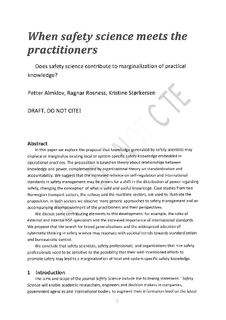When safety science meet the practitioners : Does safety science contribute to marginalization of practical knowledge?
Working paper
Permanent lenke
http://hdl.handle.net/11250/2466249Utgivelsesdato
2014Metadata
Vis full innførselSamlinger
- Vitenskapelige artikler [209]
Sammendrag
In this paper we explore the proposal that knowledge generated by safety scientists may displace or marginalize existing local or system-specific safety knowledge embedded in operational practices. The proposition is based on theory about relationships between knowledge and power, complemented by organizational theory on standardization and accountability. We suggest that the increased reliance on self-regulation and international standards in safety management may be drivers for a shift in the distribution of power regarding safety, changing the conception of what is valid and useful knowledge. Case studies from two Norwegian transport sectors, the railway and the maritime sectors, are used to illustrate the proposition. In both sectors we observe discourses based on generic approaches to safety management and an accompanying disempowerment of the practitioners and their perspectives. We discuss some contributing elements to this development: for example, the roles of external and internal HSE-specialists and the increased importance of international standards. We propose that the search for broad generalizations and the widespread adoption of cybernetic thinking in safety science may resonate with societal trends towards standardization and bureaucratic control. We conclude that safety scientists, safety professionals, and organizations that hire safety professionals need to be sensitive to the possibility that their well-intentioned efforts to promote safety may lead to a marginalization of local and system-specific safety knowledge.
